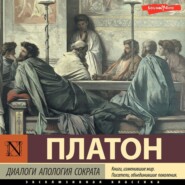По всем вопросам обращайтесь на: info@litportal.ru
(©) 2003-2024.
✖
Sophist
Настройки чтения
Размер шрифта
Высота строк
Поля
THEAETETUS: I certainly thought that we were; and I do not at all understand how we never found out our desperate case.
STRANGER: Reflect: after having made these admissions, may we not be justly asked the same questions which we ourselves were asking of those who said that all was hot and cold?
THEAETETUS: What were they? Will you recall them to my mind?
STRANGER: To be sure I will, and I will remind you of them, by putting the same questions to you which I did to them, and then we shall get on.
THEAETETUS: True.
STRANGER: Would you not say that rest and motion are in the most entire opposition to one another?
THEAETETUS: Of course.
STRANGER: And yet you would say that both and either of them equally are?
THEAETETUS: I should.
STRANGER: And when you admit that both or either of them are, do you mean to say that both or either of them are in motion?
THEAETETUS: Certainly not.
STRANGER: Or do you wish to imply that they are both at rest, when you say that they are?
THEAETETUS: Of course not.
STRANGER: Then you conceive of being as some third and distinct nature, under which rest and motion are alike included; and, observing that they both participate in being, you declare that they are.
THEAETETUS: Truly we seem to have an intimation that being is some third thing, when we say that rest and motion are.
STRANGER: Then being is not the combination of rest and motion, but something different from them.
THEAETETUS: So it would appear.
STRANGER: Being, then, according to its own nature, is neither in motion nor at rest.
THEAETETUS: That is very much the truth.
STRANGER: Where, then, is a man to look for help who would have any clear or fixed notion of being in his mind?
THEAETETUS: Where, indeed?
STRANGER: I scarcely think that he can look anywhere; for that which is not in motion must be at rest, and again, that which is not at rest must be in motion; but being is placed outside of both these classes. Is this possible?
THEAETETUS: Utterly impossible.
STRANGER: Here, then, is another thing which we ought to bear in mind.
THEAETETUS: What?
STRANGER: When we were asked to what we were to assign the appellation of not-being, we were in the greatest difficulty: – do you remember?
THEAETETUS: To be sure.
STRANGER: And are we not now in as great a difficulty about being?
THEAETETUS: I should say, Stranger, that we are in one which is, if possible, even greater.
STRANGER: Then let us acknowledge the difficulty; and as being and not-being are involved in the same perplexity, there is hope that when the one appears more or less distinctly, the other will equally appear; and if we are able to see neither, there may still be a chance of steering our way in between them, without any great discredit.
THEAETETUS: Very good.
STRANGER: Let us enquire, then, how we come to predicate many names of the same thing.
THEAETETUS: Give an example.
STRANGER: I mean that we speak of man, for example, under many names – that we attribute to him colours and forms and magnitudes and virtues and vices, in all of which instances and in ten thousand others we not only speak of him as a man, but also as good, and having numberless other attributes, and in the same way anything else which we originally supposed to be one is described by us as many, and under many names.
THEAETETUS: That is true.
STRANGER: And thus we provide a rich feast for tyros, whether young or old; for there is nothing easier than to argue that the one cannot be many, or the many one; and great is their delight in denying that a man is good; for man, they insist, is man and good is good. I dare say that you have met with persons who take an interest in such matters – they are often elderly men, whose meagre sense is thrown into amazement by these discoveries of theirs, which they believe to be the height of wisdom.
THEAETETUS: Certainly, I have.
STRANGER: Then, not to exclude any one who has ever speculated at all upon the nature of being, let us put our questions to them as well as to our former friends.
THEAETETUS: What questions?
STRANGER: Shall we refuse to attribute being to motion and rest, or anything to anything, and assume that they do not mingle, and are incapable of participating in one another? Or shall we gather all into one class of things communicable with one another? Or are some things communicable and others not? – Which of these alternatives, Theaetetus, will they prefer?
THEAETETUS: I have nothing to answer on their behalf. Suppose that you take all these hypotheses in turn, and see what are the consequences which follow from each of them.
STRANGER: Very good, and first let us assume them to say that nothing is capable of participating in anything else in any respect; in that case rest and motion cannot participate in being at all.
THEAETETUS: They cannot.
STRANGER: But would either of them be if not participating in being?
THEAETETUS: No.
STRANGER: Then by this admission everything is instantly overturned, as well the doctrine of universal motion as of universal rest, and also the doctrine of those who distribute being into immutable and everlasting kinds; for all these add on a notion of being, some affirming that things 'are' truly in motion, and others that they 'are' truly at rest.
THEAETETUS: Just so.
STRANGER: Again, those who would at one time compound, and at another resolve all things, whether making them into one and out of one creating infinity, or dividing them into finite elements, and forming compounds out of these; whether they suppose the processes of creation to be successive or continuous, would be talking nonsense in all this if there were no admixture.
THEAETETUS: True.
STRANGER: Most ridiculous of all will the men themselves be who want to carry out the argument and yet forbid us to call anything, because participating in some affection from another, by the name of that other.

















